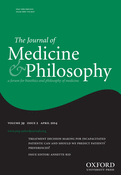-
Views
-
Cite
Cite
Stephen John, Patient Preference Predictors, Apt Categorization, and Respect for Autonomy, The Journal of Medicine and Philosophy: A Forum for Bioethics and Philosophy of Medicine, Volume 39, Issue 2, April 2014, Pages 169–177, https://doi.org/10.1093/jmp/jhu008
Close - Share Icon Share
Abstract
In this paper, I set out two ethical complications for Rid and Wendler’s proposal that a “Patient Preference Predictor” (PPP) should be used to aid decision making about incapacitated patients’ care. Both of these worries concern how a PPP might categorize patients. In the first section of the paper, I set out some general considerations about the “ethics of apt categorization” within stratified medicine and show how these challenge certain PPPs. In the second section, I argue for a more specific—but more contentious—claim that proper respect for the autonomy of incapacitated patients might require us to act on reasons which they could endorse and show how this claim places important limits on the categories employed by an ethically acceptable PPP. The conclusion shows how these concerns about apt categorization relate to more familiar worries about Rid and Wendler’s proposals.



